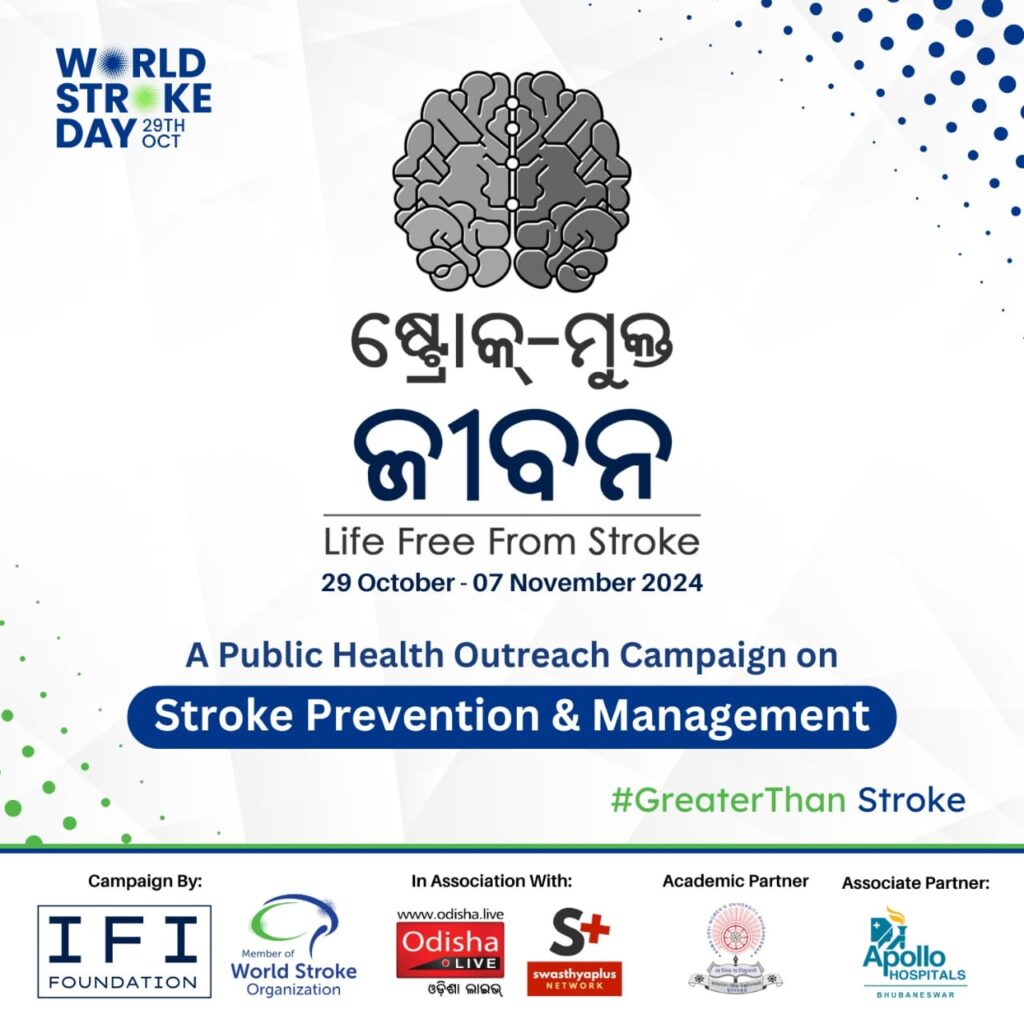If you have AF you are 5 times more likely to have a stroke. With the right treatment the risk of AF related stroke can be reduced
OdishaPlus Bureau

Atrial fibrillation (also called AFib or AF) is a condition where the heartbeat is irregular and often very fast. It is very important to know about atrial fibrillation because if left untreated, AF is a major risk factor for stroke.
If you have AF you are 5 times more likely to have a stroke. With the right treatment the risk of AF related stroke can be reduced.
What is AF?
In people with AF the two upper chambers of the heart (the atria) don’t beat effectively. As a result, blood doesn’t get pumped out properly, it pools and can form clots which can then dislodge and circulate around the body. If these clots travel to the brain and blocks a blood vessel, it can trigger a stroke.

Strokes caused by AF are more likely to be fatal or cause serious disabilities. AF related strokes are, however, highly preventable.
What are the symptoms of AF?
For many people AF is symptomless and is only detected by physical examination, or with an electrocardiogram (ECG). Other people may experience one or more of the following symptoms:
- General fatigue
- Rapid and irregular heartbeat
- Fluttering or “thumping” in the chest
- Dizziness or light-headedness
- Shortness of breath and anxiety
- Weakness
- Faintness or confusion
- Fatigue when exercising
What causes AF?
The exact cause of AF is unknown. It can affect otherwise healthy individuals, but it is more common with age and is more likely to affect people with previous heart problems or some medical conditions including:
- Diabetes
- Hyperthyroidism – overactive thyroid gland
- Lung conditions – Chronic Obstructive Pulmonary Disease (COPD), asthma, pneumonia, pulmonary embolism and lung cancer
AF is also slightly more common in men than in women.
How is AF diagnosed?
Something as simple as checking your pulse can help to diagnose AF. Some wearable devices monitor heart rate and can help you identify irregularities. A self-check or a wearable device will give you a good indication of whether you could have AF and you should discuss this with your doctor.
If your pulse rate is consistently lower than 60 or higher than 100 you should speak to your doctor. S/he may decide to conduct some tests to make an accurate diagnosis.
- Blood tests will identify any underlying conditions such as anaemia or hyperthyroidism
- An electrocardiogram (ECG) will monitor your heart rate and rhythm
- An echocardiogram will provide an ultrasound image and identifies physical problems with your heart
- Implantable cardiac monitors that used for long term monitoring of heart rate continuously over several months or years
Can AF be treated?
If your AF is caused by an underlying condition, such as hyperthyroidism, treating that condition will often resolve the AF and no further treatment is required. If there is no underlying cause for your AF your doctor will consider medications that will help to restore your heart rhythm, control your heart rate and reduce your stroke risk.
People with AF who have a medium to high risk of stroke are usually prescribed a drug called an anticoagulant. Anticoagulants stops blood from clotting. There are several different types of anticoagulants that your doctor may consider.
Warfarin is a widely used anticoagulant which requires regular blood tests to make sure you are getting the right dose and to reduce your risk of bleeding. It will help reduce your stroke risk, but warfarin can interact with other medications and cause serious problems. If you are prescribed warfarin it is important to always check with your doctor whether any existing or new medications are safe to take alongside warfarin. You should also avoid excessive alcohol consumption.
A number of new anticoagulant treatments are available that don’t interact with other medicines as much and don’t require regular blood tests so often. These drugs will reduce your stroke risk just as much as other medications and in some cases are better at reducing your risk.
If your AF cannot be controlled with medication, your doctor may consider some physical interventions such as cardioversion, catheter ablation or implanting a pacemaker device.
Is there anything I can do to prevent AF?
We can all take steps to reduce our risk of AF. Some lifestyle changes will reduce your risk and can help address other circulatory diseases.
- Manage your weight – Being overweight is a risk factor for AF and contributes to diabetes, hypertension and sleep apnea, all of which increase your AF risk
- Reduce the fat in your diet – Diets high in fat are associated with AF and contribute to atherosclerosis
- Stick to recommended levels of alcohol consumption – Excessive alcohol consumption is a risk factor for AF and also contributes to general stroke risk
- Avoid stimulants – Stimulant drugs (including those found in over the counter cold medicines), excessive caffeine and ‘energy’ drinks may trigger AF
Stroke happens either when the blood supply to part of your brain is cut off because of a blood clot, or when a brain artery ruptures and leads to a haemorrhage. Stroke is a leading cause of death and disability worldwide, but most strokes can be prevented by addressing a small number of key risk factors.
1 in 4 people are at risk of stroke in their lifetime, but by taking simple steps almost all strokes can be prevented.
(Courtesy: World Stroke Organization)
#WorldStrokeDay2024 #GreaterThanStroke #BrainStroke



























